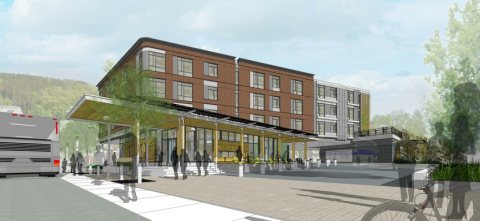On Monday, April 16 the Vermont Housing Finance Agency (VHFA) Board of Commissioners committed federal Housing Tax Credits and Vermont Affordable Housing Credits to construct and renovate apartments for low-income Vermonters over the next several years. The $3.5 million in ten-year federal capped credits, $319,000 in ten-year federal uncapped “bond” credits and $173,000 in five-year state credits will support the development of 251 apartments in eight communities across the state. VHFA permanent and construction financing totaling $19 million was also approved for five of the projects.

Housing tax credits are the single largest source of funding for the development of affordable rental housing. The equity raised when investors buy the tax credits awarded to projects is used to pay construction and renovation costs for apartments rented to low-income Vermonters. This system allows affordable housing developers to raise far more start-up capital than the face value of the tax credits. This year’s credit awards are expected to create $37 million in upfront equity to pay for the costs of developing the apartments. Together with VHFA loans, this is likely to cover 69 percent of all development costs for the eight upcoming projects. Many of these projects will be developed through partnerships between regional housing organizations and Housing Vermont, a statewide, non-profit developer and tax credit syndicator.
“This year’s project applicants saw the benefits of a 12.5 percent increase in the Housing Credit allocation approved by Congress in March” remarked Sarah Carpenter, Executive Director of VHFA. “However, VHFA still received twice as many applications for tax credits as we were able to approve. Limits on the amount of federal and state credits available each year continue to prevent Vermont from more fully addressing the severe, long-standing shortage of affordable housing throughout the state.”
The investments made by VHFA this week will fund the construction of new, high-quality apartments, most of which will be reserved for Vermont households earning below 60 percent of the area median. Median income in Vermont in 2016 was $57,677, according to the latest estimates from the U.S. Census Bureau. Several projects will offer much deeper subsidies for the lowest-income households and for those at risk of homelessness. As a condition of funding, these new projects must keep rents affordable for at least 30 years, though most of the projects have committed to remaining affordable in perpetuity.
The projects include City Center, which will create 42 affordable apartments on Market Street in South Burlington. The site is within walking distance of many amenities including grocery stores, a mall, schools, library, and medical offices. The project is sponsored by Champlain Housing Trust and Housing Vermont.
East Allen Apartments will include 27 affordable units half a mile from downtown Winooski with convenient access to public transportation. The building will contain an exercise room, common areas, and underground parking. Seven of the homes will have access to on-site supportive services provided by COTS to support formerly homeless households. Green Mountain Development Group is the project sponsor.
Oliva Place in Lyndon will have 16 affordable apartments in a mixed income building. Two units will offer SASH supportive housing services, which coordinates the resources of social-service agencies and health providers to help seniors and those with disabilities to live more independently. In addition, four homes at the property will serve homeless and at risk households. Rural Edge & Housing Vermont are co-sponsors.
In Brattleboro, Snow Block will create 18 affordable apartments on a vacant site on Flat Street, within walking distances of stores, the library, and transportation. The proposed building will be constructed to achieve Passive House certification, which means it will use much less energy for heating and cooling than comparable buildings. The project is sponsored by Windham & Windsor Housing Trust.
Sykes Mountain Ave in Hartford will include 21 affordable apartments less than one mile from downtown White River Junction. It will have underground parking, a community room, a playground, community gardens and access to walking trails. The project, sponsored by Twin Pines Housing Trust and Housing Vermont, also received funding from the Sustainability Bonds sale managed by VHFA earlier this year.
Taylor Street in Montpelier will offer affordable apartments to 19 households. The building is part of a mixed-use development that will incorporate a new city transit center on the bottom floor. The site is located next to the Montpelier recreation path and is close to downtown stores and services. Downstreet Housing and Housing Vermont are sponsors.
VHFA also awarded federal bond credits and Vermont State Tax Credits to two projects that will significantly rehabilitate older buildings, helping retain Vermont’s limited supply of affordable rental housing. Housing Vermont will renovate nine affordable apartments at Bristol Family Housing, providing much-needed improvements to reduce maintenance costs and save energy. Appletree Apartments in Fair Haven has 40 affordable apartments, about half of which are set aside for senior residents. Renovations will bring the building up to current codes and significantly improve accessibility and energy efficiency. That project is sponsored by Housing Trust of Rutland County.
In addition to the housing credits, other funding sources for these developments include permanent financing provided by VHFA as well as grants and loans from the Vermont Housing and Conservation Board, the federal HOME program, the National Housing Trust Fund, the Federal Home Loan Bank’s Affordable Housing Program, local housing trust funds, NeighborWorks, the Vermont Community Development Program and USDA Rural Development.
Photo: One Taylor Street, Montpelier Vermont. Courtesy gbA Architecture and Planning
